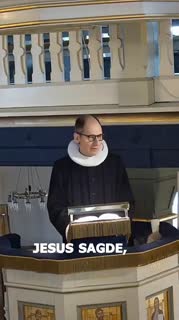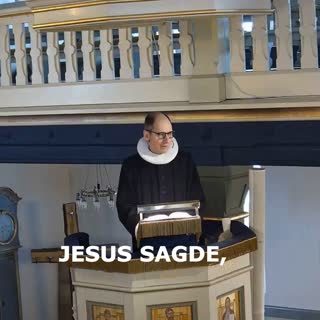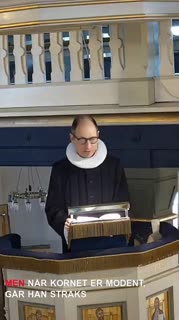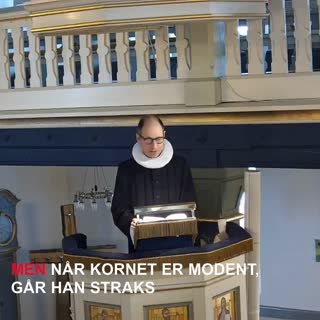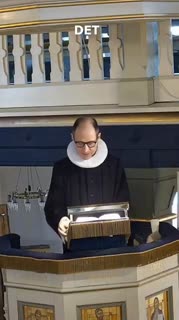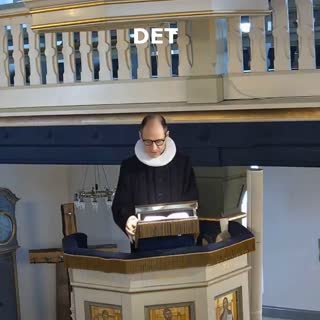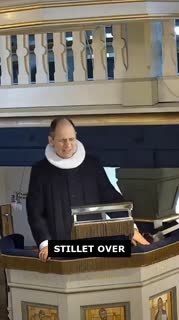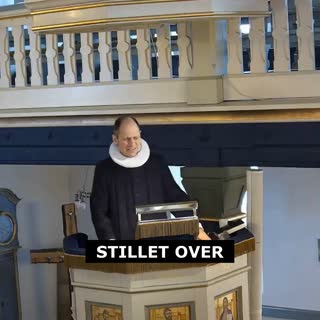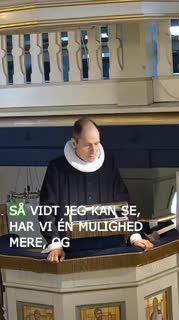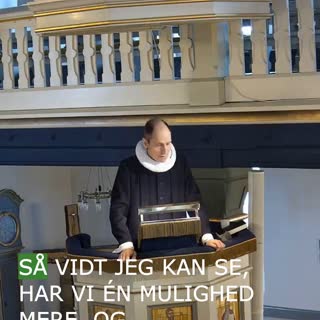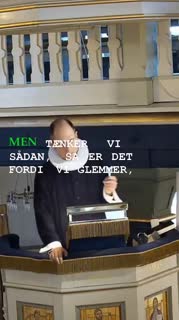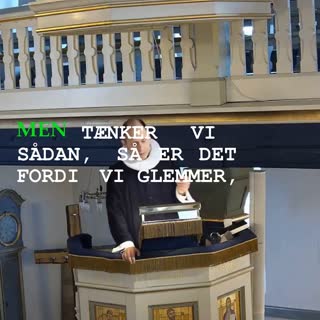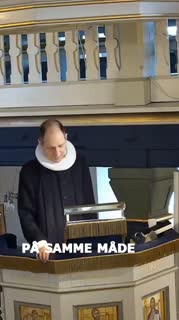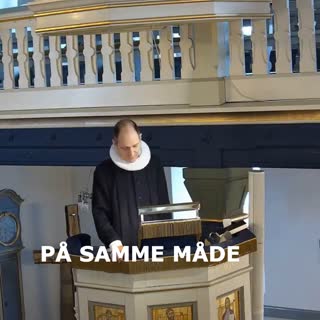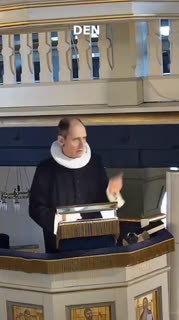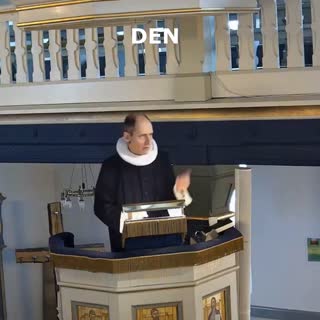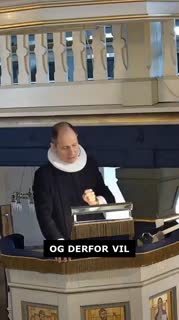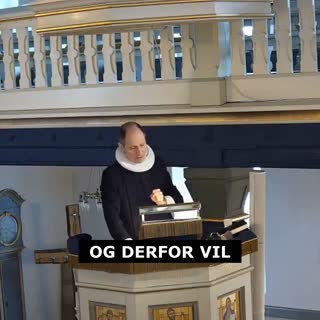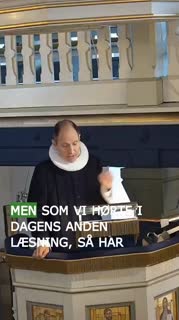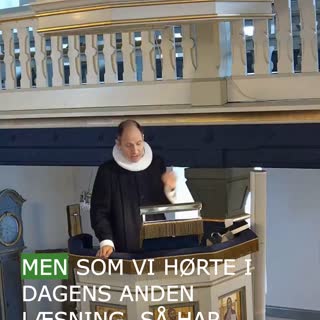Hope and Faithfulness in God's Kingdom
Devotional
Sermon Summary
Bible Study Guide
Sermon Clips
"Jesus sagde, med Guds rige er det ligesom med en mand, der har tilsået jorden. Han sover og står op nat og dag, og kornet spiger og vokser, uden at han ved hvordan." [00:21:58] (14 seconds)
"Men når kornet er modent, går han straks i gang med sejlen, for høsten er ende. Og han sagde, hvad skal vi sammenligne Guds rige med, hvilken lignelse skal vi bruge om det?" [00:22:21] (16 seconds)
"Det er ligesom et sennepsfrø. Når det kommer i jorden, er det mindre end alle andre frø på jorden. Men når det er sået, vokser det op og bliver større end alle andre planter og får store græne, så himlens fugle kan bygge reddet i dit skygge." [00:22:37] (17 seconds)
"Stillet over for alle de her dystre udsigter, så er der umiddelbart to veje. Vi kan vælge at gå. Vi kan resignere, indse, at slaget er tabt, og det bedste, vi kan håbe på, er at udskyde det uundgåelige." [00:27:02] (25 seconds)
"Så vidt jeg kan se, har vi én mulighed mere, og det er, det er at holde fast i håbet imod alle otte. Det virker måske temmelig naivt at tro, at det kan komme til at ende godt, både for kirken og for verden som helhed." [00:28:09] (20 seconds)
"Men tænker vi sådan, så er det fordi vi glemmer, at den midterste og vigtigste del af processen, nemlig væksten, den er det Gud, der skaber. Det kommer ikke an på, at det er Gud, men har vi overhovedet noget, vi kan så?" [00:36:20] (20 seconds)
"På samme måde gælder det også på det åndelige område, at hvad et menneske sår, skal det også høste, som Paulus skriver i Galaterbrevet. Så hvis vi drømmer om at komme til at høste vækst af retfærdighed og fred og glæde i Guds rige, så kræver det jo, at det vi sår, det er noget, der stammer fra Gud." [00:36:53] (22 seconds)
"Den måde, som vi så Guds gode frø på i verden, det er ved at leve i lydighed mod hans ord. Og det er i grunden ikke så interesseret, som en af det gamle testamentes profeter sammenfattede det." [00:39:46] (17 seconds)
"Og derfor vil det også være sådan, at hvis vi såer Guds kærlighed ved at adlyde Guds ord og stole på ham, så bliver det også Guds rige, der vokser op, fordi det er Guds rige, der er DNA 'et i det, der bliver sået, selvom det er småt." [00:40:37] (17 seconds)
"Men som vi hørte i dagens anden læsning, så har Gud besluttet at frelse dem, som tror netop ved den dårskab, der prædikes om. Hvad er altså det for en dårskab? Jo, selve grundlaget for den frelse, som vi tror og håber på, bliver lagt ved det, det, der frem for noget blev betragtet som både tåbligt og forarveligt." [00:41:24] (23 seconds)
Ask a question about this sermon
"Men når kornet er modent, går han straks i gang med sejlen, for høsten er ende. Og han sagde, hvad skal vi sammenligne Guds rige med, hvilken lignelse skal vi bruge om det?" [00:22:21] (16 seconds)
"Det er ligesom et sennepsfrø. Når det kommer i jorden, er det mindre end alle andre frø på jorden. Men når det er sået, vokser det op og bliver større end alle andre planter og får store græne, så himlens fugle kan bygge reddet i dit skygge." [00:22:37] (17 seconds)
"Stillet over for alle de her dystre udsigter, så er der umiddelbart to veje. Vi kan vælge at gå. Vi kan resignere, indse, at slaget er tabt, og det bedste, vi kan håbe på, er at udskyde det uundgåelige." [00:27:02] (25 seconds)
"Så vidt jeg kan se, har vi én mulighed mere, og det er, det er at holde fast i håbet imod alle otte. Det virker måske temmelig naivt at tro, at det kan komme til at ende godt, både for kirken og for verden som helhed." [00:28:09] (20 seconds)
"Men tænker vi sådan, så er det fordi vi glemmer, at den midterste og vigtigste del af processen, nemlig væksten, den er det Gud, der skaber. Det kommer ikke an på, at det er Gud, men har vi overhovedet noget, vi kan så?" [00:36:20] (20 seconds)
"På samme måde gælder det også på det åndelige område, at hvad et menneske sår, skal det også høste, som Paulus skriver i Galaterbrevet. Så hvis vi drømmer om at komme til at høste vækst af retfærdighed og fred og glæde i Guds rige, så kræver det jo, at det vi sår, det er noget, der stammer fra Gud." [00:36:53] (22 seconds)
"Den måde, som vi så Guds gode frø på i verden, det er ved at leve i lydighed mod hans ord. Og det er i grunden ikke så interesseret, som en af det gamle testamentes profeter sammenfattede det." [00:39:46] (17 seconds)
"Og derfor vil det også være sådan, at hvis vi såer Guds kærlighed ved at adlyde Guds ord og stole på ham, så bliver det også Guds rige, der vokser op, fordi det er Guds rige, der er DNA 'et i det, der bliver sået, selvom det er småt." [00:40:37] (17 seconds)
"Men som vi hørte i dagens anden læsning, så har Gud besluttet at frelse dem, som tror netop ved den dårskab, der prædikes om. Hvad er altså det for en dårskab? Jo, selve grundlaget for den frelse, som vi tror og håber på, bliver lagt ved det, det, der frem for noget blev betragtet som både tåbligt og forarveligt." [00:41:24] (23 seconds)
